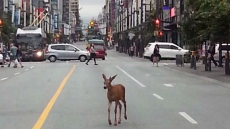VANCOUVER — Tahn Donovan tears up as she recalls watching a murder of crows circle above a singing First Nations' man, the birds crowing as he broke into traditional song in the middle of Vancouver's Stanley Park.
"It just really resonated with me," said the Australian aboriginal woman, smiling at the memory of a recent indigenous-led tour she took of the expansive green space. "And then the crows started to sing.
"That connection with culture and land. ... To hear somebody sing for their country is really special."
Donovan, who represents an indigenous tourism council in Western Australia, was in Vancouver this past weekend as one of more than 100 delegates at the second annual Pacific Asia Indigenous Tourism and Trade Conference.
The three-day event, which ended Monday, brought together indigenous groups from around the world to form partnerships, share stories and discuss best practices on promoting the burgeoning field. A key element explored the value of that unique relationship between First Nations and the environment.
Delivering the conference's keynote address was renowned National Geographic explorer-in-residence Wade Davis who told delegates that indigenous tourism could potentially revolutionize the industry by encouraging a better appreciation of cultural diversity.
"I think there's a moral and huge opportunity to become ambassadors for an entire new way of being, a new geography of hope," said Davis.
But it needs to go beyond leveraging quotas of First nations into the field, he added.
"Real tourism is when aboriginal societies on their own terms can share their visions of life in a profound way that gives the visitor a true sense of authenticity, such that a visitor goes away as an avatar of the wonder of culture."
Aboriginal Tourism Association of B.C. head Keith Henry said First Nations' tourism is unique because it provides a snapshot into a culture and its people.
"We see visitors who are really looking for new experiences, unique experiences — they want to know the true history and story of the land," he said.
"That's what aboriginal tourism does for all of tourism, not just for aboriginal communities but for all of Canada."
Indigenous tourism in B.C. employs 3,400 people, reached $50 million in revenue this year and Henry expects it to hit $68 million by 2017.
Cuts to B.C. Ferries last year prompted criticism from First Nations' entrepreneurs concerned about the impact reduced service would have on offering authentic travel experiences to remote coastal areas.
"It's very important not only for jobs but it's also about cultural sustainability or revitalization," Henry added. "We've seen a lot of communities where tourism has been really the incubator to really helping a new sense of pride in the community."
That was the case with Dennis Thomas, a member of the Tseil-Waututh Nation and general manager of an ecotourism canoe and kayak business in North Vancouver.
"Fifteen years ago I didn't really know anything about my culture," he said.
"Given that opportunity by my leaders to come and learn and know the history of my people and my songs, it just made me a better person."




